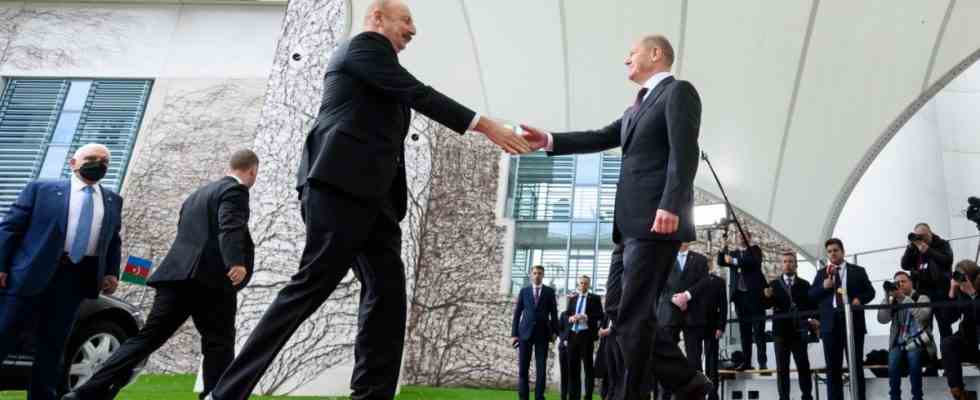When Federal Chancellor Olaf Scholz wanted to describe the far-reaching consequences of the turning point for the German economy in the procurement of raw materials some time ago, he tried to use a somewhat outdated expression. “We can’t afford to be etepetete,” said Scholz.
On Tuesday, a burly man with a mustache stands by his side, and the chancellor sticks to the resolution. “Azerbaijan is a partner of growing importance for Germany and the European Union,” says Scholz in a friendly manner. The country has “the potential to make an important contribution to the diversification of German and European energy supply when it comes to oil and gas”.
Poor human rights scores, but a welcome substitute for Russia
The man with the mustache likes to hear it. It’s Ilham Aliyev, the President of Azerbaijan. Aliyev inherited the post from his father 20 years ago. In the country’s authoritarian regime, power is “strongly concentrated in the hands of Aliyev,” according to the human rights organization Freedom House, which classifies Azerbaijan as clearly not free and gives the country miserable marks in all relevant categories.
Scholz comes, he is so expected, to speak carefully about this circumstance. “Our basic conviction here in Germany is,” he says, “a vibrant civil society is part of democracy. We can only benefit from it.” Aliyev routinely ignores this, preferring to talk about business. And that is developing positively since Russia stopped supplying oil and gas to Germany and most other EU countries. The comparatively modest exports to Germany alone increased by 148.8 percent last year.
“Azerbaijan is a reliable partner for Europe. We are increasing our gas exports to Europe,” promised the President in the Chancellery. Since the Russian war against Ukraine, European interest in gas from Azerbaijan has skyrocketed. His country reacted and increased deliveries from eight billion cubic meters a year to twelve billion cubic meters. In 2027, as agreed with the European Union last year, the aim is to deliver 20 billion cubic meters.
“Dignity on the Battlefield” restored with Armenia
Aliyev emphasizes that Azerbaijan also has great potential for renewable energies, for example through wind power from the Caspian Sea. Scholz calls it all “very impressive”. Deliveries from Azerbaijan strengthened European energy security. That is in the common interest and at the same time, the Chancellor praised, “an expansion of renewable energies is taking place”. Azerbaijan is one of the economic beneficiaries of the Russian war of aggression, but is keeping a low profile politically. Even during the press conference, Aliyev did not say a bad word about the Russian aggression. Scholz takes care of that. “Putin must abandon his ludicrous project and withdraw Russian troops from Ukraine,” he says.
Scholz also spoke about the tense situation between Azerbaijan and Armenia. Right now, in view of the “geopolitical turning point”, efforts must be intensified to settle the conflict between Armenia and Azerbaijan peacefully, he warns. Since a war in 2020 over Nagorno-Karabakh, which is inhabited by Armenians but belongs to Azerbaijan under international law, there have been repeated skirmishes and hostilities between the two Caucasus countries. “The situation is unsustainable in the long term and harbors the risk of further escalation,” warns Scholz.
Aliyev is not impressed by that either. Instead, he points out that in 2020 his country managed to regain territory that belonged to Azerbaijan after 30 years. In this way, Azerbaijan has “restored its dignity and territorial integrity on the battlefield”.

